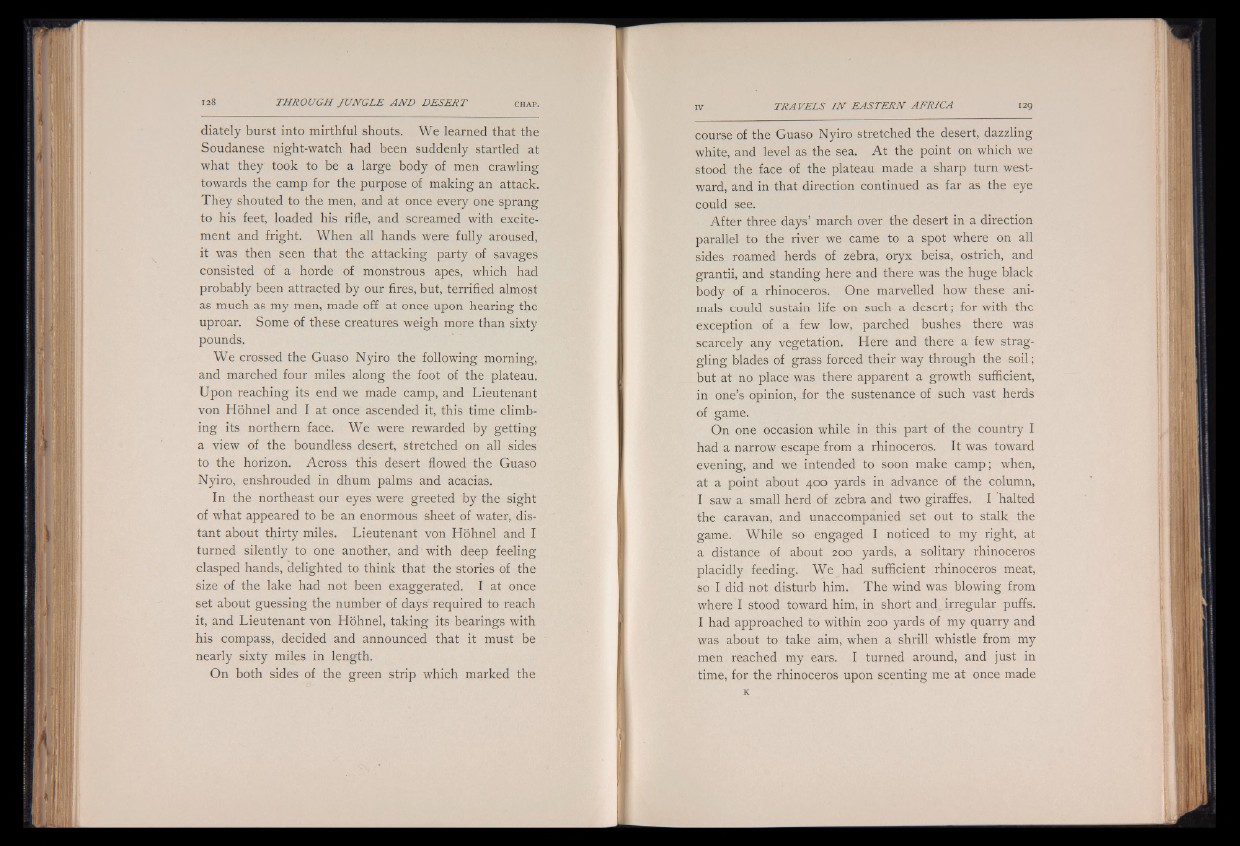
diately burst into mirthful shouts. We learned that the
Soudanese night-watch had been suddenly startled at
what they took to be a large body of men crawling
towards the camp for the purpose of making an attack.
They shouted to the men, and at once every one sprang
to his feet, loaded his rifle, and screamed with excitement
and fright. When all hands were fully aroused,
it was then seen that the attacking party of savages
consisted of a horde of monstrous apes, which had
probably been attracted by our fires, but, terrified almost
as much as my men, made off at once upon hearing the
uproar. Some of these creatures weigh more than sixty
pounds.
We crossed the Guaso Nyiro the following morning,
and marched four miles along the foot of the plateau.
Upon reaching its end we made camp, and Lieutenant
von Hohnel and I at once ascended it, this time climbing
its northern face. We were rewarded by getting
a view of the boundless desert, stretched on all sides
to the horizon. Across this desert flowed the Guaso
Nyiro, enshrouded in dhum palms and acacias.
In the northeast our eyes were greeted by the sight
of what appeared to be an enormous sheet of water, distant
about thirty miles. Lieutenant von Hohnel and I
turned silently to one another, and with deep feeling
clasped hands, delighted to think that the stories of the
size of the lake had not been exaggerated. I at once
set about guessing the number of days required to reach
it, and Lieutenant von Hohnel, taking its bearings with
his compass, decided and announced that it must be
nearly sixty miles in length.
On both sides of the green strip which marked the
course of the Guaso Nyiro stretched the desert, dazzling
white, and level as the sea. A t the point on which we
stood the face of the plateau made a sharp turn westward,
and in that direction continued as far as the eye
could see.
After three days’ march over the desert in a direction
parallel to the river we came to a spot where on all
sides roamed herds of zebra, oryx beisa, ostrich, and
grantii, and standing here and there was the huge black
body of a rhinoceros. One marvelled how these animals
could sustain life on such a desert; for with the
exception of a few low, parched bushes there was
scarcely any vegetation. Here and there a few straggling
blades of grass forced their way through the soil;
but at no place was there apparent a growth sufficient,
in one’s opinion, for the sustenance of such vast herds
of game.
On one occasion while in this part of the country I
had a narrow escape from a rhinoceros. It was toward
evening, and we intended to soon make camp; when,
at a point about 400 yards in advance of the column,
I saw a small herd of zebra and two giraffes. I halted
the caravan, and unaccompanied set out to stalk the
game. While so engaged I noticed to my right, at
a distance of about 200 yards, a solitary rhinoceros
placidly feeding. We had sufficient rhinoceros meat,
so I did not disturb him. The wind was blowing from
where I stood toward him, in short and irregular puffs.
I had approached to within 200 yards of my quarry and
was about to take aim, when a shrill whistle from my
men reached my ears. I turned around, and just in
time, for the rhinoceros upon scenting me at once made